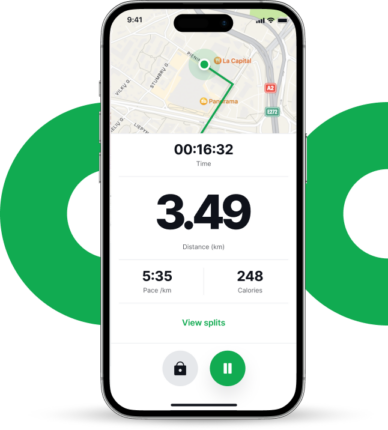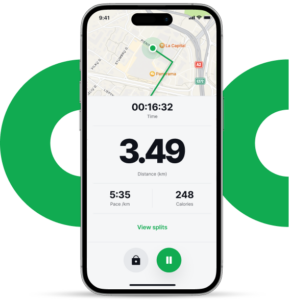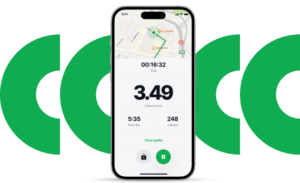The short answer to how many miles is a marathon is 26.2. But there’s so much more behind this popular event than its distance.
In this post, we’ll take a look at how long a marathon is by comparison with other distances and how this event differs from 5k, 10k, and other races.
We’ll also share with you some key tips to help you build the endurance to run a marathon and finish it with a good time. Ready when you are!
In This Article
In This Article:
How Long Is a Marathon?
We’ve seen how long a marathon is in miles – 26.2 miles. To be more precise, it’s 26 miles and 385 yards.
If we convert 26.2 miles to kilometers, the marathon distance becomes 42.16481km. But according to the IAAF competition rules for road races, the standard marathon distance for men and women is 42.195km.
Good to know: 1 kilometer is 0.62 miles. Knowing how far 1k in miles is makes it easy to convert any race distance from km, whether it’s a standard length distance or not.
If you’re thinking about running a marathon, chances are you’ve already tried running other distances or are planning to. To help you avoid any confusion, here are all the popular running event distances in miles.
How far is a 5K race?
A 5K is 3.1 miles. That’s half of a 10K and one-third of a 15K.
How far is a 10K race?
A 10K is 6.2 miles. Twice as long as the 5K, it’s still considerably shorter than the marathon.
How far is a 15K race?
A 15K event is 9.32 miles. That’s the same distance as running a 5K and then a 10K straight after without stopping.
How far is a half marathon?
A half marathon is 13.1 miles, exactly half the distance of the modern marathon event.
How far is an ultramarathon?
An ultramarathon is any race longer than 26.2 miles. Popular ultramarathon distances are 50K (31 miles), 100K (62 miles), 50 miles, and 100 miles. The world’s longest certified ultramarathon is the Self-Transcendence 3,100-mile race (5,000 kilometers), which is about 1,534 kilometers longer than the Moon’s diameter.
The Length of a Marathon Compared to Other Distances
Understanding the challenges that a marathon poses can become easier if we think of those 26.2 miles in a less abstract way than simple numbers. So, how far is a marathon compared to other distances?
If you run a marathon in the inner lane of a running track, it’s no less than 105 laps. A lap on an outdoor track is 400 meters. You’d have to run 4 laps to get to 1 mile.
Meanwhile, a straightway on a track is 100 meters, so to complete a marathon, you’d have to run the equivalent distance of over 421 and a half 100-meter sprints – good thing you won’t have to sprint through them!
On the plus side, a marathon is nowhere near as long as what some consider the longest street in the world, Yonge Street in Toronto, Canada, which measures a whopping 1,178 miles.
The mythical street, if not the actual one, is long enough for 44 marathons to be run on it simultaneously without the competitors from one marathon getting to meet those from the next.
Since 25 miles is only 40.23 kilometers, if you were running it downward rather than forward, you’d be able to just break through the Earth’s crust or outermost layer, which is 40 kilometers deep and contains all known life in the universe. And you’d better get some heat protection, as the mantle’s temperature can reach up to 6,692 degrees Fahrenheit.
But before our heads start spinning with so many numbers, let’s take a peek at the history of the marathon.
History of the Marathon
The original Olympic games held from 776 BCE through 393 AD in Olympia, Greece, featured sprinting and other running events, but not long-distance endurance races.
During that time, however, long-distant messengers who ran for miles between settlements were employed by the Greeks and other nations. Difficult or inexistent roads often made it impossible for horses to cover such distances, so human runners were more reliable.
The first marathon race was held in 1896 at the beginning of the Games’ modern era. It was 40 kilometers or about 25 miles long. This was around the same distance that the mythical Greek messenger Pheidippides was believed to have run from Marathon to Athens in 490 BCE to convey the word of the Greek troops’ triumph over the invading Persians.
Following the first modern Games, the Boston Marathon was organized in 1897. Held to this date, it’s the world’s oldest annual marathon and one of the most prestigious events for runners.
Despite the growing popularity of the event in the 20th century, the first Olympic marathon for women wasn’t held until 1984, when 50 women from 28 countries came together for the race in Los Angeles, California.
Why Is the Marathon 26.2 Miles?
The initial distance of a marathon was, as we’ve seen, only around 25 miles. Competitors didn’t run the full marathon as we know it today until the 1908 Olympics in London.
The role of the royal family in modifying the marathon distance is more or less established. The story goes that Queen Alexandra of Great Britain requested the marathon race to begin on the lawn of Windsor Castle – so her little children could see the start from their nursery – and finish in front of the royal box at the Olympic stadium. The distance between these points happened to be 26 miles and 385 yards.
This distance stuck and was officially standardized in 1921. Since then, the Olympic marathon in miles has been 26.2 miles.
How Long Does It Take to Run a Marathon?
Finishing times for marathons tend to be around 4 to 5 hours for most runners, according to Healthline. But taking time to enjoy the scenery and walking parts of the race can add 2 to 3 more hours to your finish time.
If you’re wondering what’s a good running pace, running the mile in 9 to 11.5 minutes can be a good start.
Fact: Runners between 30 and 50 years tend to have the best marathon finishing times, according to 2019 The State of Running report.
The current official marathon world record is held by the Kenyan runner Eliud Kipchoge, who ran the 2018 Berlin Marathon in 2:01:39. The women’s world record was set by Brigid Kosgei in 2019, who ran the Chicago Marathon in 2:14:04.
In the end, finishing a marathon under 4 hours is quite a performance if you’re not a seasoned runner and not something you should push for if you’re running your first marathon.
Factors Affecting Marathon Time
Some runners have better running endurance than others, but many other factors can affect your marathon time. Most of these are within your control.
- Training – It’s not just about how long you train but also how many miles you add up every week. For best results, you want to follow a personalized training plan adapted to your current fitness level. You’ll see better results than following a general training plan.
- Hydration – Dehydration affects your running performance. You have to stay hydrated when training, before the race, as well as during the event itself. This calls for a hydration plan. Specially formulated drinks and/or supplements with electrolytes can provide better results than plain water, which lacks essential minerals that get depleted while you run.
- Nutrition – Training and running a marathon means burning more calories than normal. It’s not just about how many calories you eat but their quality. Healthy high-carb foods that don’t upset your stomach can help you improve your performance.
- Course conditions – Training on flat trails may not prepare you for a hilly course, which can add minutes to your mile pace. Elevation levels also matter – it can be harder to perform at your best in high elevations. Your training program should take into account the course conditions.
- Weather – The best marathon times are achieved in colder weather. But training in hot weather can make you a faster marathon runner. Trying to predict the weather conditions during the marathon and training in similar conditions can help you get the best time.
Estimate Your Marathon Time
Estimating your marathon time is one of the best ways to optimize your training and get a feel for the pace you should be aiming for.
A popular formula for calculating your race time was devised by researcher and marathoner Pete Riegel:
T2 = T1 x (D2/D1) 1.06
T1 – Given time
D1 – Given distance
D2 – Predicted distance
T2 – Time for predicted distance
This formula requires knowing the time for a previous event, whether it’s a marathon or a different running event.
For example, if you’ve recently run a 10K in 60 minutes, your predicted marathon finish would be 5:13:01 with a pace of 11:56 per mile.
This race predictor calculator can do the math for you.
Tip: Keep in mind that no marathon race time predictor is fully accurate. Use one only for broad estimations.
Marathon Training Plan
Training for a marathon can take anywhere from 12 to 20 weeks, depending on whether you’re a beginner, intermediate, or advanced runner.
While you can go from couch to marathon, it’s often more rewarding to go from couch to 5K first and then do progressively harder races until you build the fitness level to compete in a marathon. Pushing yourself too much too soon increases the risk of common running injuries and may sideline you.
How long should your longest run be when you train for a marathon? There is some controversy over this, but the prevalent advice is that your longest run shouldn’t exceed 20 miles. This conditions your body for the race while minimizing your risk of injury.
The best way to train for a marathon is to follow a personalized marathon training plan adapted to your physical characteristics, activity level, and nutrition.
With the right training plan, you can run a marathon more easily and enjoy the entire experience of becoming a marathon runner.
Takeaway
In the end, here are the key points to remember:
- A marathon is 26.2 miles or 26 miles and 385 yards, which is the equivalent of roughly 42 kilometers.
- The first marathon race was organized in 1896 at the first edition of the modern Olympic Games.
- The initial marathon distance was only 25 miles, in honor of the Greek messenger Pheidippides, but this was increased to 26.2 miles at the request of the British Royal Family during the 1908 London Olympics.
- The key factors that affect your marathon time are training, nutrition, hydration, weather, and course conditions.
- Most recreational runners finish a marathon in 4 to 5 hours.
- You need 12 to 20 weeks to train for a marathon, depending on your fitness level.
Ready to start today?
Frequently Asked Questions
How long does it take to train for a marathon if I’m a beginner?
A beginner runner should give themselves at least 5-6 months to train for a full marathon. This will give them enough time to gradually build up their endurance and strength, and to reduce their risk of injury.
What is a good pace for a beginner marathon runner?
A good pace for a beginner marathon runner is to run at a conversational pace. This means that you should be able to carry on a conversation while you’re running. If you’re struggling to talk, you’re probably running too fast.
How can I avoid injuries while training for a marathon?
There are a number of things you can do to avoid injuries while training for a marathon. These include:
- Gradually increasing your mileage: Don’t try to increase your mileage too quickly, as this can lead to overuse injuries.
- Cross-training: Incorporate other activities into your training, such as swimming, cycling, or yoga, to give your running muscles a break.
- Strength training: Strengthening your core and leg muscles can help to improve your running form and reduce your risk of injury.
- Rest and recovery: Make sure to get enough rest and recovery between your runs. This will give your body time to repair itself and prevent injuries.
What are some tips for fueling and hydrating during a marathon?
It’s important to fuel and hydrate properly during a marathon to maintain your energy levels and prevent dehydration. Here are a few tips:
- Eat a light breakfast 2-3 hours before the race.
- Take in fluids and carbohydrates during the race. There are a number of different ways to do this, such as drinking sports drinks, eating gels or chews, or wearing a hydration vest.
- Listen to your body: If you’re feeling hungry or thirsty, don’t hesitate to take in more fluids and carbohydrates.
What are some common mistakes that marathon runners make?
There are a number of common mistakes that marathon runners make. These include:
- Not training enough: Not training enough is one of the biggest mistakes that runners make. This can lead to a number of problems, including fatigue, injury, and poor performance.
- Not fueling and hydrating properly: Proper fueling and hydration are essential for success in a marathon. Not taking in enough fluids and carbohydrates can lead to dehydration, fatigue, and muscle cramps.
- Not tapering properly: Tapering is the process of gradually reducing your training volume in the weeks leading up to the race. This helps to reduce your risk of injury and allows your body to recover from training.
- Not pacing yourself properly: Pacing yourself is important for avoiding burnout and ensuring that you have enough energy to finish the race. Don’t start out too fast, as this will lead to fatigue later in the race.
- Not warming up and cooling down: Warming up and cooling down are essential for preventing injuries. A good warm-up will prepare your muscles for exercise, while a good cool-down will help to reduce muscle soreness and improve recovery.
References:
- Galloway, J., 2001. Marathon: you can do it!. Shelter Publications, Inc..
- Hoogkamer, W., Kram, R. and Arellano, C.J., 2017. How biomechanical improvements in running economy could break the 2-hour marathon barrier. Sports Medicine, 47, pp.1739-1750.
- Stevinson, C.D. and Biddle, S.J., 1998. Cognitive orientations in marathon running and” hitting the wall”. British journal of sports medicine, 32(3), pp.229-234.
- Berndsen, J., Smyth, B. and Lawlor, A., 2020, September. Fit to run: Personalised recommendations for marathon training. In Proceedings of the 14th ACM Conference on Recommender Systems (pp. 480-485).
- Buman, M.P., Omli, J.W., Giacobbi Jr, P.R. and Brewer, B.W., 2008. Experiences and coping responses of “hitting the wall” for recreational marathon runners. Journal of Applied Sport Psychology, 20(3), pp.282-300.
- Summers, J.J., Sargent, G.I., Levey, A.J. and Murray, K.D., 1982. Middle-aged, non-elite marathon runners: A profile. Perceptual and motor skills, 54(3), pp.963-969.














